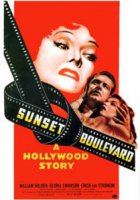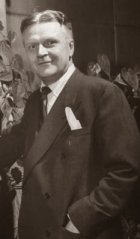
Sunset Boulevard Page #6
- NOT RATED
- Year:
- 1950
- 110 min
- 1,883 Views
Gillis enters the SHOT and she leads him into
A-32 NORMA DESMOND'S BEDROOM
It is a huge, gloomy room hung in white brocade which
has beconle dirty over the years and even slightly
torn in a few places. There's a great, unmade gilded
bed in the shape of a swan, from which the gold had
begun to peel. There is a disorder of clothes and
negligees and faded photographs of old-time stars
about.
In an imitation baroque fireplace some logs are burn-
ing. On the massage table before it lies a small
form shrouded under a Spanish shawl. At each end on
a baroque pedestal stands a three-branched cande-
labrum, the candles lighted.
NORMA:
I've made up my mind we'll bury him in
the garden. Any city laws against that?
GILLIS:
I wouldn't know.
NORMA:
I don't care anyway. I want the
coffin to be white. And I want
it specially lined with satin.
White, or deep pink.
She picks up the shawl to make up her mind about the
color. From under the shawl flops down a dead arm.
Gillis stares and recoils a little. It is like a
child's arm, only black and hairy.
NORMA:
Maybe red. bright flaming red.
Gay. Let's make it gay.
Gillis edges closer and glances down. Under the
shawl he sees the sad, bearded face of a dead
chimpanzee. Norma drops back the shawl.
NORMA:
How much will it be? I warn you -
don't give me a fancy price just
because I'm rich.
GILLIS:
Lady. you've got the wrong man.
For the first time. Norma really looks at him
through her dark glasses.
GILLIS:
I had some trouble with my car.
Flat tire. I pulled into your
garage till I could get a spare.
I thought this was an empty house.
NORMA:
It is not. Get out.
GILLIS:
I'm sorry, and I'm sorry you lost
your friend, and I don't think red
is the right color.
NORMA:
Get out.
GILLIS:
Sure. Wait a minute -- haven't
I seen you -- ?
NORMA:
Or shall I call my servant?
GILLIS:
I know your face. You're Norma
Desmond. You used to be in
pictures. You used to be big.
NORMA:
I am big. It's the pictures
that got small.
GILLIS:
I knew there was something
wrong with them.
NORMA:
They're dead. They're finished.
There was a time when this busi-
ness had the eyes of the whole
wide world. But that wasn't good
enough. Oh, nol They wanted the
ears of the world, too. So they
opened their big mouths, and out
came talk, talk, talk...
GILLIS:
That's where the popcorn business
comes in. You buy yourself a bag
and plug up your ears.
NORMA:
Look at them in the front offices --
the master minds! They took the
idols and smashed them. The
Fairbankses and the Chaplins and
the Gilberts and the Valentinos.
And who have they got now? Some
nobodies -- a lot of pale little
frogs croaking pish-poshl
GILLIS:
Don't get sore at me. I'm not
an executive. I'm just a writer.
NORMA:
You are! Writing words, words!
You've made a rope of words and
strangled this businessl But there
is a microphone right there to catch
the last gurgles, and Technicolor
to photograph the red, swollen tongue!
GILLIS:
Ssh! You'll wake up that monkey.
NORMA:
Get out!
Gillis starts down the stairs.
GILLIS:
Next time I'll bring my autograph
album along, or maybe a hunk of
cement and ask for your footprints.
He is halfway down the staircase when he is
stopped by
NORMA:
Just a minute, you!
GILLIS:
Yeah?
NORMA:
You're a writer, you said.
GILLIS:
Why?
Norma starts down the stairs.
NORMA:
Are you or aren't you?
GILLIS:
I think that's what it says on my
driver's license.
NORMA:
And you have written pictures,
haven't you?
GILLIS:
Sure have. The last one I
wrote was about cattle rustlers.
Before they were through with it,
torpedo boat.
Norma has reached him at the bottom of the staircase.
NORMA:
I want to ask you something.
Come in here.
She leads him into
It is dark and damp and filled with black oak and
red velvet furniture which looks like crappy props
from the Mark of Zorro set. Along the main wall,
a gigantic fireplace has been freezing for years.
On the gold piano is a galaxy of photographs of
Norma Desmond in her various roles. On one wall
is a painting -- a California Gold Rush scene,
Carthay Circle school. (We will learn later that
it hides a motion picture screen.)
One corner is filled with a large pipe organ, and
as Norma and Gillis enter, there is a grizzly
moaning sound. Gillis looks around.
Translation
Translate and read this script in other languages:
Select another language:
- - Select -
- 简体中文 (Chinese - Simplified)
- 繁體中文 (Chinese - Traditional)
- Español (Spanish)
- Esperanto (Esperanto)
- 日本語 (Japanese)
- Português (Portuguese)
- Deutsch (German)
- العربية (Arabic)
- Français (French)
- Русский (Russian)
- ಕನ್ನಡ (Kannada)
- 한국어 (Korean)
- עברית (Hebrew)
- Gaeilge (Irish)
- Українська (Ukrainian)
- اردو (Urdu)
- Magyar (Hungarian)
- मानक हिन्दी (Hindi)
- Indonesia (Indonesian)
- Italiano (Italian)
- தமிழ் (Tamil)
- Türkçe (Turkish)
- తెలుగు (Telugu)
- ภาษาไทย (Thai)
- Tiếng Việt (Vietnamese)
- Čeština (Czech)
- Polski (Polish)
- Bahasa Indonesia (Indonesian)
- Românește (Romanian)
- Nederlands (Dutch)
- Ελληνικά (Greek)
- Latinum (Latin)
- Svenska (Swedish)
- Dansk (Danish)
- Suomi (Finnish)
- فارسی (Persian)
- ייִדיש (Yiddish)
- հայերեն (Armenian)
- Norsk (Norwegian)
- English (English)
Citation
Use the citation below to add this screenplay to your bibliography:
Style:MLAChicagoAPA
"Sunset Boulevard" Scripts.com. STANDS4 LLC, 2025. Web. 23 Feb. 2025. <https://www.scripts.com/script/sunset_boulevard_993>.







Discuss this script with the community:
Report Comment
We're doing our best to make sure our content is useful, accurate and safe.
If by any chance you spot an inappropriate comment while navigating through our website please use this form to let us know, and we'll take care of it shortly.
Attachment
You need to be logged in to favorite.
Log In